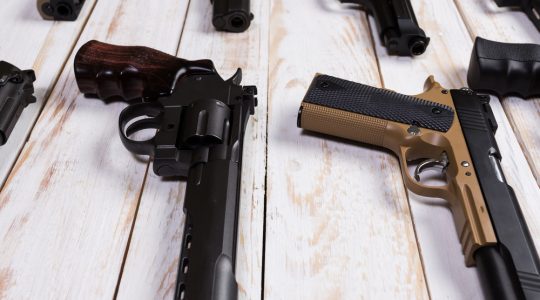
What Weapons Are Illegal in Texas?
- December 28, 2016
- The Law Office of Greg Tsioros
- Comments Off on What Weapons Are Illegal in Texas?
What Weapons Are Illegal in Texas?
One of the few things that you can get most Texans to agree on is that they are strongly protective of their right “… to keep and bear arms…” But even the State of Texas realizes that the citizens’ fervor has to be tempered and has enacted laws placing limits on what types of firearms and other related devices its citizens are allowed to keep and bear.
In this post we’ll take a broad look at the Texas gun and weapons laws and the penalties that you can expect should you run afoul of those laws, but first we need to look at the “mother of all gun laws” (18 U.S.C § 922), better known as “Felon in Possession of a Firearm.”
“Felon in Possession”
Under federal law anyone convicted of a felony is barred from owning a firearm of any type, of any size, and for any purpose for life. This same law also bars other groups such as fugitives from justice, controlled substance addicts, anyone discharged from the Armed Forces under dishonorable conditions, and illegal aliens from possessing or owning a firearm.
In Texas, a convicted felon or someone convicted of misdemeanor domestic violence may possess a firearm in his or her place of residence after five years from the date of release from prison or the date of completion of parole, whichever is later. It is unlikely that a federal charge would be filed if you comply with Texas law, but it could happen.
Weapons that are Illegal in Texas
Texas law explicitly bans the possession or use of the following types of weapons:
- Improvised handguns, aka “zip guns”
- Any shotgun or rifle that has been shortened to a length of 26 inches or less
- Shotguns whose barrels are less than 18 inches long
- Rifles with barrels less than 16 inches long-term
- Machine guns or any weapon having the capability of being fired automatically
- Explosive devices such as hand grenades, rockets and rocket propelled grenades (RPG), dynamite, and improvised explosive devices (IED)
- Certain types of ammunition (armor piercing), chemical dispersion devices, and silencers
Although the above-listed weapon types are generalizations of types and not all-inclusive, it will serve to illustrate the penalties that can be handed down to those possessing them.
- Improvised handguns, automatic weapons, illegally shortened rifles or shotguns, silencers, or armor piercing ammunition – Third-degree felony and punishable by from 2 to 10 years in state prison and/or a fine of up to $10,000.
- Explosive devices, grenades, RPGs, IEDs, dynamite, and chemical dispersion devices – Third-degree felony and punishable by from 2 to 10 years in state prison and/or a fine of up to $10,000.
You should also be aware that possession of any of the above weapons or devices can easily have your charges upgraded or enhanced. Possession of the firearms and/or devices mentioned can also result in a federal firearms charge and that, if you are convicted, the federal charges can be sentenced separately from any Texas convictions. Simply put, if you are convicted and sentenced on both state and federal charges, you don’t start serving your second sentence until you have finished serving the first.
Other Weapons-Related Crimes in Texas
There are a number of other charges that are either weapons charges in their own right or can serve as an enhancement to any other charges you might be facing. As you may have guessed, most of them can be used against you in federal court as well.
- Illegally carrying a weapon other than a firearm – One crime unique to Texas is that of illegally carrying a weapon other than a firearm. Unless you have a state handgun concealed carry license, it is illegal to carry around or transport any kind of weapon in Texas. Illegally carrying is usually a Class A misdemeanor unless it is carried to special places. It is then a third degree felony.
In Texas, a weapon is a club, nightstick, blackjack, knife whose blade is greater than 5 ½ inches in length, spears, and swords except at your place of business or if being transported for a legitimate reason.
- Illegal sale or transfer of a firearm, improper storage of a firearm – If you sell or give a firearm to someone who is not allowed to legally own such a weapon, it is a Class A misdemeanor. Storing a loaded weapon where a child can reach it is a Class C misdemeanor unless it results in a death or serious injury, in which case it becomes a Class A misdemeanor.
There are numerous ways that you may violate the state weapons laws of Texas, and it doesn’t help that some of Texas’ laws are not exactly same as the federal laws that deal with the same type.
State and federal firearms and explosives laws are constantly changing. If you are facing a state weapons charge, or are seeking advice on how to avoid such charges, it is strongly suggested that you contact a criminal defense attorney with experience in dealing with both state and federal firearms and explosives laws. In the interim, it is always safer to leave it at home rather than risk a run-in with law enforcement.

